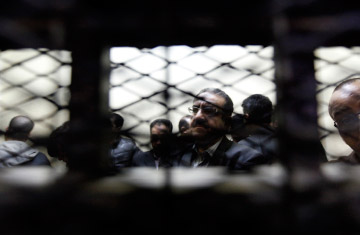
Accused Egyptian activists sit in a caged docket during the opening of their trial in Cairo on Feb. 26, 2012
(2 of 2)
Inside the packed courtroom, police officers and court officials tried repeatedly to quiet the melee. "Anybody who talks could be put in jail!" a court official shouted at one point as cameramen stood on benches and clung to the windows. Another person banged incessantly on a table, and a woman burst into tears. "It's been a nightmare," said Leila Abaza, a close family friend of one of the defendants. "I've been working in civil society since 2002, and this has never happened before. We're disturbed because it's a message to civil society. It's a punishment for all of civil society." Rights groups have warned that the NGO crackdown signifies far more than a possible breakdown in U.S.-Egyptian relations; it could have dire consequences for Egypt's nascent democracy at a time when the country needs democracy-promotion efforts most. "I can tell you they are very transparent, and the training they were giving is really needed during this period," said Saeed Ali, whose daughter, an employee of NDI, sat in the defendants' cage. "It's ridiculous," he added. "I think the SCAF [Supreme Council of the Armed Forces] and the government are trying to create a big fuss to cover up other problems."
The defendants present for the first hearing denied all of the charges against them, and their attorneys presented written requests to the judges for access to witnesses and evidence, as well as monetary compensation for their clients, while prosecutors called for the maximum sentencing. One shouted that the penal code be amended to allow for harsher sentences. The trial was adjourned until April 26th.
It's unclear whether the American defendants will be compelled to attend the next hearing. Typically when a defendant is absent to make his or her defense in an Egyptian court, the judge often opts for the maximum sentencing. However, a conviction in absentia does not necessarily result in immediate fulfillment of the sentence if the convicted returns to the country. "We've been so uninformed about everything since the beginning of the case," Nancy Okail, the Egypt director of Freedom House, told TIME the day before her trial.
Several high-ranking Cairo judges have told TIME that verdicts in Egypt's corrupt justice system generally have little to do with criminal guilt and everything to do with politics and connections. And some of the Egyptian defendants' families and friends were worried on Sunday that their loved ones might be forced to bear the brunt of a case that they say is rooted in international politics. Outside the court, dozens of supporters of the "Blind Sheik" — Omar Abdel Rahman, the convicted mastermind of the 1993 World Trade Center bombing — called for his release from a U.S. prison in exchange for the American defendants. At other times, they called for the Americans' execution. Campbell of NDI said that the U.S. embassy has been working on the case for weeks, but that he had no specific information about their efforts.
Jail time for the Americans would almost certainly push the U.S. Administration to cut off Egypt's military aid. But analysts say the crisis has already escalated to such an extent — fueled in large part by state media — that Egypt's rulers would face a public-opinion backlash if they back down now. One face-saving option may involve a guilty verdict with a "suspended" sentence — something that would enable the government to appear strong in its conviction while avoiding a serious diplomatic disaster. At the end of the session, all of the defendants were allowed to go free — for now. "On a legal basis, we have a very strong position — our papers are very clean, very clear," says Okail. "But we don't know how far this could go."
